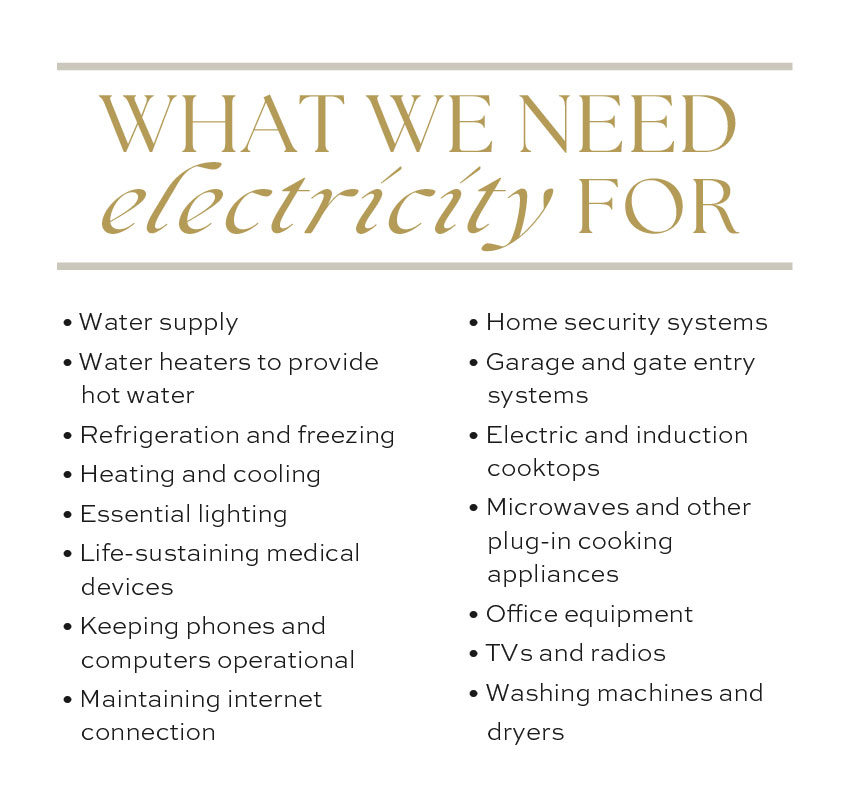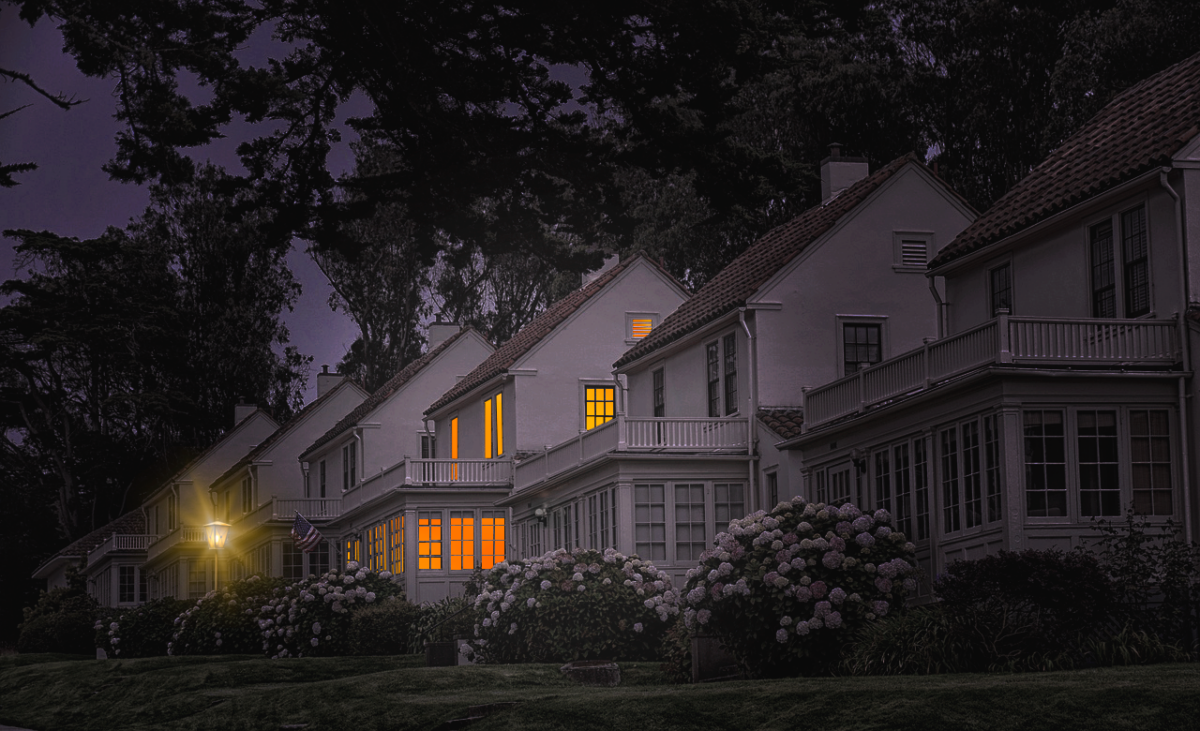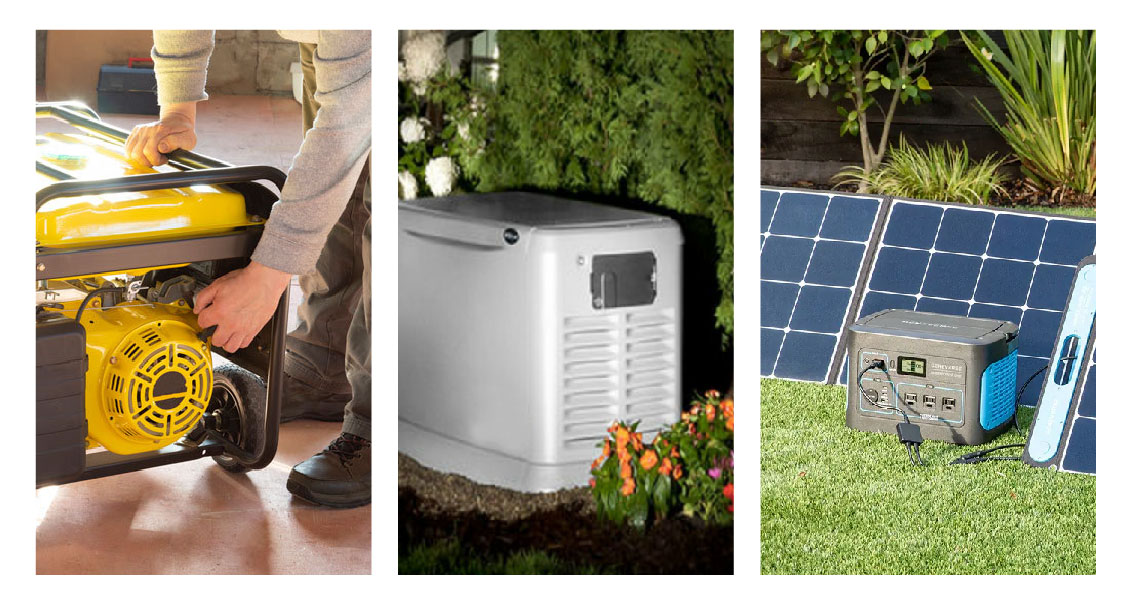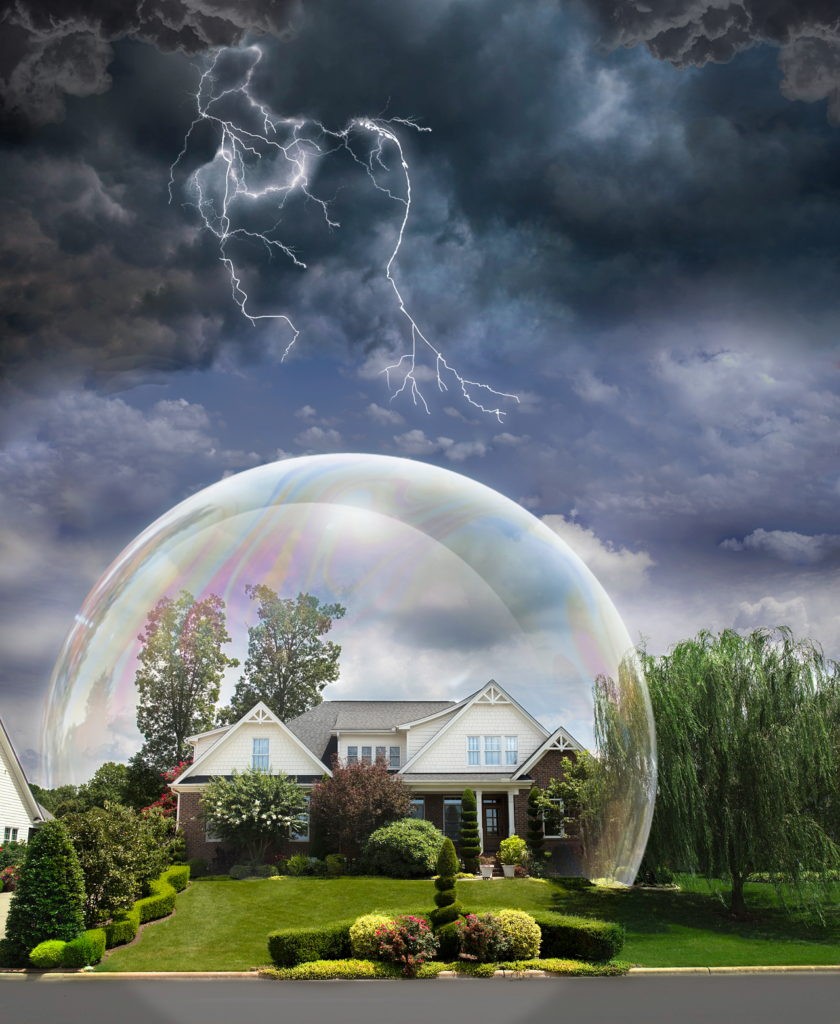It’s on ALL our minds after Storm Beryl knocked out power for nearly 3 million Texas households this week…
How dependent are we now on electricity?
The answer: more than we realize, until the power is out. The disruption of a power outage is more than inconvenient today: it’s dangerous.
With 12% of Texans working entirely from home now, the storm was an instant knockout of any communication with work…or with loved ones. Food, too, only stays safe in the fridge for four hours during a power outage.
…And with temperatures over 90 degrees all over the state, going without air conditioning quickly becomes dangerous. And there are still homes without power right now.
A home generator, though? What’s required to install one?And HOW are you supposed to select the right kind?
These are questions you need answered. Get the answers to these and more with this guide to home generators…starting with learning why this is no “luxury investment” for families today, but a necessary protection for your health and way of life.
Households That Need Generators
Sitting in your entertainment room with your family, your favorite show flashes across the screen. Your phone sits on the arm of the sofa, and you flip it over to see if your boss has emailed you back yet. One of the kids is on the carpet with her tablet, and you can hear the other making popcorn in the kitchen.
A storm is gusting outside.
You suddenly lose power, and your home plunges into darkness. The hum of your beverage refrigerator in the corner stops abruptly, and the air in the room stands still. You can almost feel it become a degree hotter as you wonder, “will the power come back on?”
Sometimes, it does.
…And sometimes, you’re stuck in a long-term power outage.
…The popping of the popcorn on the stove upstairs slows, then stops.
Convenience…and Necessity
The households that need backup energy aren’t just those with electric-powered induction cooktops or multiple devices per-person. There are families with very real work needs, medical needs, and safety requirements who depend on generators.
From the family member who sleeps with a CPAP machine to the new parents who store breast milk in the fridge, these are the most common reasons why families today need home generators:

- Water supply (sump pumps that prevent flooding, for example, during storms that knock power out)
- Ensuring water heaters continue to provide hot water supply
- Refrigeration and freezing
- Heating and cooling during summer and winter
- Lighting (more than convenience, lighting is also a safety feature in areas like the kitchen and bathrooms)
- Powering life-sustaining medical devices (like ventilators, dialysis machines, and oxygen concentrators)
- Keeping phones, computers, and internet routers operational (especially for households where someone works from home)
- Ensuring home security systems remain functional
- Powering garage entry systems and gates around your home
- Operating electric and induction cooktops, microwaves, and other plug-in cooking appliances
- Powering office equipment
- Keeping TVs and radios running (for leisure and to stay up to date about a natural disaster)
- Running washing machines and dryers
The need for a home generator is more complex today than ever before. Generators meet a household’s critical needs during power outages to ensure not only comfort, but safety and quality of life.
What kind of generator should you choose, though? Next, take a look at the options, and what they each provide…
Types of Generators
It’s story time…

Let’s look into one household to see how their generator selection played out…
The Jones are committed to living sustainably, and they decided to invest in a solar generator. These newer generators charge batteries stored in the home, and the Jones made the space for a full wall of batteries in their garage.
Confident that they were well-prepared for any power outage, the Jones were proud of their investment.
They were unaware, though, of the limitations that came from relying only on solar energy.
It was a summer night when the winds began to howl, and the Jones hunkered down to play a boardgame in the family room. The kids were still young, and the couple treasured the time together. They hardly noticed how ominously dark it had grown outside.
With rain lashing against the windows, the home’s power flickered. The Jones each looked instinctively at the pendant lights glowing above the kitchen island before the lights each made a POP noise then went dark. The rest of the lights flickered off around them.
…Then, a hum came from the garage. The solar generator had kicked on, and the whole house seemed to purr as the lights came back on. The squares of tungsten light streamed from the windows onto their lawn, glowing in stark contrast to the rest of the street, whose homes were all blacked out.
Imagine their surprise, then, when the Jones woke up in the middle of the night to find that the power was gone again, and the generator was no longer working. The solar generator’s energy stores had depleted, and the storm continued to rage outside. The following day, storms continued, and in the overcast the solar panels weren’t able to charge.
The Jones’ story tells us why it’s essential to consider the types of home generators at your disposal…and to select wisely, depending on your household needs and where you live.
Types of Generators and What They’re Best For
Each generator comes with its benefits and disadvantages. It’s important to know how they’re different, and how each kind of generator matches up.
These are the residential generators most popular today…
- Portable generators — these are small and can be carried around, so you can store it in your garage, then set it outside to run it during an emergency. They’re usually powered by gas or propane. Their portable size does mean they have limited capacity and should only be used for essential-only electronics during very short power outages.
- Standby generators — these are one of the top systems installed as a whole-home solution. They’re placed permanently and they turn on automatically when a power outage is detected. They’re powered by gas, propane, or diesel. They provide seamless power in households with medical equipment or other essential electronics.
- Solar generators — these systems use solar panels to convert sunlight into electricity, which is stored in a battery for use during outages. The more electricity you need, the more batteries you have to purchase, maintain, and store. Many batteries can store between 4 and 10 hours of electricity, depending on how many devices, appliances, and systems you use while the power is out.
- Dual-fuel generators — these generators can run on either of two different fuels (usually gas and propane). They offer flexibility and extended runtime options, making them ideal for emergency preparedness. Each tank of fuel can provide 8-20 hours of energy, depending on the load your household uses.

So…what kind of generator should you get?
Even if you saw one type of generator and thought, “YES, that’s what we need,” check your thinking on this logic tree…your answer might surprise you! At the very least, it will help you consider things that you hadn’t already…
- Do you experience (or, based on where you live, might you experience) prolonged power outages?
- YES — continue to 2
- NO — continue to 3
- Do you want a generator that turns on automatically and can power most of your home?
- YES — OK, then a standby generator is probably best for you
- NO — continue to 3
- Do you have sensitive electronics that need clean, stable power?
- YES — OK, then a standby generator is probably best for you
- NO — continue to 4
- Will your energy needs during an outage be minimal (i.e., can you get by with nothing more than charging a phone and letting the fridge run, for instance)?
- YES — OK, then you might get by with a portable generator
- NO — continue to 5
- Are you looking for a sustainable energy solution and live in an always-sunny area?
- YES — OK, then you might benefit from a solar generator
- NO — continue to 6
- Do you have limited access to one fuel type, or do you live in an area with a higher risk of long-term outages with natural disasters?
- YES — OK, then you could benefit from a dual-fuel generator
- NO — a portable generator for temporary use might be your best investment
WHAT’S LIFE LOOK LIKE after INSTALLATION?
Next to the Jones’ house, the Smiths are huddled inside their home when the storm starts. As power flickers and fails up and down the block, their standby generator roared to life, seamlessly restoring electricity.

This picture depends on one more thing after selecting the right generator, though…it ALSO depends on regular generator maintenance.
Here’s what required home generator maintenance looks like:
- Performing regular inspections
- Making oil changes
- Air filter replacements
- Fuel system maintenance
- Battery checks and replacement
- Spark plug maintenance
- Checking coolant levels (for liquid-cooled generators)
- Exercising the generator (run it for 20-30 minutes each month)
If you’re thinking, “wait, I want a generator for peace of mind…not for another to-do list,” there’s good news: all this maintenance is performed by professionals. (This type of generator maintenance and other home system checks are why we offer our Signature Home Maintenance Membership.)
And what about the noise?…
Life after a home generator installation also means one more possible disruption…the noise. Generators are notorious for being noisy, BUT you can consider multiple different sound solutions, like:
- Enclosing the generator in a soundproof enclosure
- Installing sound barriers around the generator
- Selecting the right location to install the generator
- Using rubber mounts or pads under the generator to dampen vibrations
- Adding a high-quality exhaust silencer
- Building a dedicated, insulated shed or structure for the generator
- Planting dense, leafy trees or shrubs around the generator area as vegetative barriers
- Selecting high-quality generators to begin with!
Other Home Generator FAQs:
How often do power outages occur in my area? And how long do they last?
If you’re considering a home generator, this is definitely a question to ask (if you haven’t already).
Search online for the area you live in…for example, here around Keller, Texas, we know that there’s an average of 4-5 big outages in the state each year. Each one lasts, on average, 3-4 hours…but in cases like the storm this week, that can stretch into days for some households.
Know the common reasons for power outages in your area, too. Once again, if we’re looking just at Texas, we can lose power due to:
- Hurricanes and tropical storms
- Thunderstorms and tornadoes
- Ice storms and freezes
- High demand during heat waves
- Overloaded equipment like overheated transformers (also during heat waves)
- Aging infrastructure
- Insufficient infrastructure maintenance
- Wildfires and damage to power lines
What size generator do I need?
If you’re unsure what the size or capacity of your generator should be, you can start by outlining your home’s power requirements. List your essential appliances and systems. Talk to a home service professional about the total wattage for those systems, or check the manuals of your “must-run” appliances to see.
Add up the wattage requirements…and consider future needs, too.
Based on a realistic idea of the total wattage your home needs to stay comfortable and safe, select a generator that is rated for that total power output or higher. You might see power output listed in watts (W) or kilowatts (kW).
When in doubt, ask a professional!!
What are the installation requirements for a home generator?
If you’re ready to install a home generator, ensure that your home is ready to support it. That means:
- Identifying an appropriate location (outdoors, and on a stable surface)
- Obtaining the necessary permits according to your local regulations
- If you don’t have one, installing a transfer switch (an Automatic Transfer Switch or a Manual Transfer Switch, depending on the kind of generator)
- Getting a professional inspection of your electrical system to ensure it can support it
- Getting the fuel supply set up (know where to place tanks, and how to store fuel safely)
- Configuring your ventilation and exhaust system for the generator
Once again…all of this is taken care of by a professional. Know who to contact for a comprehensive look at the affected systems in your home…for example, a design-build firm like ours with experience in whole-home systems and transformations.
What is the lifespan of a generator?
Generators’ lifespans depend a LOT on these two factors:
- The kind of generator
- How well maintenance is kept up
Portable generators live around 10-15 years, for example, while standby generators can function efficiently up to 30.
Will a generator affect my home insurance and property value?
Installing a home generator could affect your home insurance premiums. Some insurance providers offer discounts, for instance, because a generator — especially a standby generator — reduces the risk of damage caused by power outages, like frozen pipes. However…other insurers might consider it a risk if it’s not properly installed or maintained correctly.
Check with your provider to see what the case is for you!!
Generators almost always increase the resale value of the home, though. Once again, this depends on the generator’s regular maintenance. Understanding the market implications for your home still requires a conversation with your realtor.
What are the environmental impacts of a home generator?
Home generators, particularly those that run on fossil fuels, do create greenhouse gases. The frequency of use, however, is typically so low (once a year for a 4 to 8-hour period) that the emissions are imperceptible to overall greenhouse gas production.
Still, air quality around your home is another thing to consider while the generator is running. This means that you have to work with someone who knows how and where to install the generator to avoid even a brief outage impacting the air quality in your home.
This is a decision you can make now. It’s in your power to enhance your home’s resilience to major emergencies by installing a home generator. And by selecting the right one for your home and lifestyle, you protect your loved ones and your lifestyle, ensuring your home remains the oasis you need it to be…no matter the storm.
Contact us to talk about a generator for your home!!
About the author

Robin Burrill, RID, NCIDQ, ASID, IDS, CAPS, is an award-winning professional kitchen, bath, and interior designer. Robin and her husband, Robert Mathews, have owned Signature Home Services, Inc. for nearly three decades, establishing a superior in-house team with a widespread reputation for delivering meticulous design to their many repeat clients.
In 2022, the national publication, Kitchen and Bath Design News magazine, named Robin to their Top Innovator list in recognition of her achievements in the field of kitchen and bath design. In 2024, she was named one of the Fall 2024 Market Pros and “tastemakers” by ANDMORE at High Point Market. Also in 2024, Fixr identified her as one of the Top Professional Interior Designers for their nationwide audience. Over her extensive career, Robin has been quoted in Architectural Digest and Forbes multiple times; her design work has been featured in top national trade publications; and she has been interviewed for Designers Today magazine’s “Profiles in Design” video series, among others. Widely respected for the depth of her knowledge, Robin is a sought after speaker and judge for many design industry events.
In 2023, Robin designed a bench for Charleston Forge, making her foray into product design. Robin currently serves as a volunteer on the board of the Dallas/Ft. Worth chapter of the Interior Design Society.


Thanks for this excellent guide to what to look for in a generator. With the weather events seeming to be more and more extreme and frequent, it’s becoming more of a necessity.
Couldn’t agree more, Janet. It’s also such a benefit for homeowners now to have multiple options for types of generators, including what kinds of energy they run on!
Robin- Thanks for this excellent guide to what type of generator will be best for each homeowner’s situation. I think about buying a generator all the time. Now I will feel more confident making a selection.
I’m so glad to read that, Lisa!